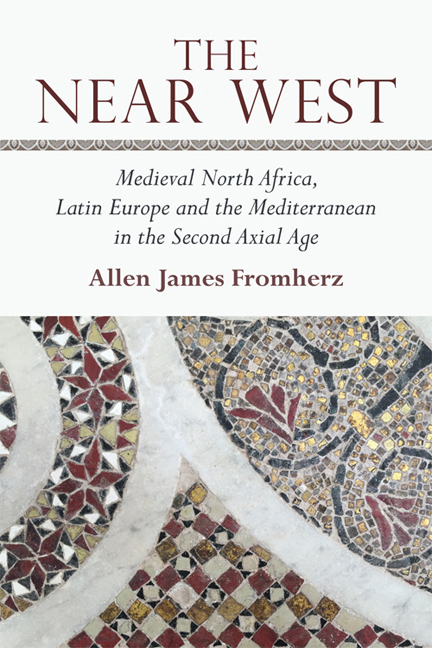Book contents
- Frontmatter
- Contents
- Map: The Near West – Medieval North Africa and Europe
- Personal Note and Acknowledgments
- Introduction: North Africa and the Mediterranean Paradox
- 1 Bèjaïa: Introducing North Africa, Latin Europe and the Mediterranean
- 2 Rome: North Africa and the Papacy
- 3 Tunis: Axis of the Middle Sea
- 4 Marrakech: The Founding of a City
- 5 The Almohads: Empire of the Western Mediterranean
- 6 Between City and Countryside: Ibn Khaldun and the Fourteenth Century
- 7 Conclusions: A Second Axial Age
- Notes
- Bibliography
- Index
Introduction: North Africa and the Mediterranean Paradox
Published online by Cambridge University Press: 23 September 2017
- Frontmatter
- Contents
- Map: The Near West – Medieval North Africa and Europe
- Personal Note and Acknowledgments
- Introduction: North Africa and the Mediterranean Paradox
- 1 Bèjaïa: Introducing North Africa, Latin Europe and the Mediterranean
- 2 Rome: North Africa and the Papacy
- 3 Tunis: Axis of the Middle Sea
- 4 Marrakech: The Founding of a City
- 5 The Almohads: Empire of the Western Mediterranean
- 6 Between City and Countryside: Ibn Khaldun and the Fourteenth Century
- 7 Conclusions: A Second Axial Age
- Notes
- Bibliography
- Index
Summary
This book tells a story of interaction between Berbers, Arabs, Latins, Muslims, Christians and Jews in North Africa and Latin Europe and across the Western Mediterranean. The book proposes medieval Western European and North African history were part of a common Western Mediterranean culture. It tells the history of North Africa and Europe through the eyes of Christian kings and Muslim merchants, emirs and popes, Sufis, friars and rabbis. It argues North Africa and Europe together experienced the Twelfth-Century Renaissance and the Commercial Revolution. When Europe was highly divided during the twelfth century, North Africa was enjoying the peak of its power, united under the Berber, Almohad Empire. In the midst of a commercial growth throughout the medieval period, North Africa and Europe also shared in a burst of spirituality and mysticism. Indeed, parallel developments in intellectual, religious and economic history in North Africa and Europe were so common, they cannot be considered purely accidental. This growth of spirituality occurred as representatives of Judaism, Christianity and Islam debated and defended their faiths, dreaming of conversion even as they shared the same rational methods. Growth of organized mysticism instigated a Second Axial Age in the history of religion. Sufis and Franciscans, followers of voluntary poverty, rubbed shoulders in the bustling markets of Tunis, Marrakech and Bèjaïa. Challenging the idea of a Mediterranean split between Islam and Christianity, the book shows how the Maghrib (North Africa) was not a Muslim-Arab monolith, nor an extension of an exotic Orient. North Africa, not the Holy Land to the Far East, was the first place where Latin Europeans encountered the Muslim other and vice versa. At the same time, medieval North Africa was as diverse and complex as Latin Europe. North Africa was, in fact, an integral part of Western history.
Paradox of Sources
A mystery within a paradox is written into this book. It is a paradox of the book's sources. Due to the nature of our evidence, two very different, but parallel, histories of the relationship between medieval North Africa and Latin Europe could be written. One history, based on a superficial reading of some of the writings of Jewish, Christian and Muslim chroniclers and legists, monks and religious scholars, would tell a story of conquest, a story of conflict. It would tell the story in apocalyptic proportions of the dream of conversion.
- Type
- Chapter
- Information
- The Near WestMedieval North Africa, Latin Europe and the Mediterranean in the Second Axial Age, pp. 1 - 12Publisher: Edinburgh University PressPrint publication year: 2016



